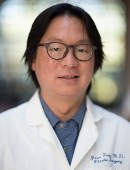Faculty Focus: Q&A with Jess Ting, MD

In this installment of Faculty Focus, we present ASPS member Jess Ting, MD, assistant professor of surgery at the Icahn School of Medicine at Mount Sinai Hospital. Dr. Ting completed his general surgery training at the Columbia-Presbyterian Medical Center and his plastic surgery training at the University of Pittsburgh Medical Center. Dr. Ting also completed a fellowship in Hand Surgery and Microsurgery at the Hospital for Special Surgery in New York. But the area of expertise for which he's now in most demand is transgender surgery – he's the director of surgery at Mount Sinai's Center for Transgender Medicine and Surgery.
Dr. Ting grew up in New York and is musically gifted, as well as being a leader in plastic surgery. The combination bore great fruit when he earned undergraduate and graduate degrees from the Juilliard School of Music as a classical double bass player.
Dr. Ting says he's proud to be at the forefront of transgender surgical training, and he's encouraged by the interest in this important and burgeoning field being demonstrated by residents and young plastic surgeons. He recommends that above all, residents keep an open mind for whatever life's possibilities may present – and he says he's arrived at a place of work/life balance that includes his three loves: family, music and medicine.
PSR: What drew you to plastic surgery?
Dr. Ting: I had intended to do internal medicine and did a sub-i in plastics on a whim. It ended up being the closest thing in medicine to the creative outlet that music had been for me – I trained at Juilliard to be a classical musician – and that made the decision easy.
Three years ago, I was unexpectedly given the opportunity to re-train in gender surgery as part of our institution's drive to start a transgender surgery program. I learned how dire the need for more gender surgeons was and how underserved the population is. That's when I decided to switch full-time to gender surgery.
PSR: How did you prepare during residency to get into a competitive Fellowship?
Dr. Ting: The best preparation I did for my Fellowship was to network in the hand surgery world. Fellowships are often about who you know, not necessarily who you are.
PSR: What effect did the Fellowship have upon your career advancement?
Dr. Ting: Being hand-fellowship trained got me my first (and present) job, but I gradually shifted into other clinical areas. I think that happens a lot, so my advice to young surgeons is to keep an open mind and never stop learning.
PSR: How important is a mentor in one's early years of practice?
Dr. Ting: As an Asian-American, I found it particularly helpful to have other Asian-Americans as role models and mentors. It's very helpful to have mentors whose past experiences mirror your own and after whom you can model your own trajectory.
PSR: What's the most important attribute for a successful resident?
Dr. Ting: Honesty and integrity. Everything else can be taught or compensated for.
PSR: How do you balance your time between your professional and personal lives?
Dr. Ting: Family comes first. Then music – I'm still an avid amateur musician. Medicine is a great career, but it's only once facet of my life.
PSR: How did you handle your biggest non-medical challenge of residency?
Dr. Ting: Developing a healthy work/life balance and learning to prioritize things outside of work made me a happier and more effective doctor.
PSR: What do you enjoy the most about being a plastic surgeon?
Dr. Ting: Being able to do something new every day.
PSR: What are some of the recurring challenges of your practice?
Dr. Ting: Juggling a crushing backlog of patients with the development of a new clinical program. In three years, we've grown from one to three-and-a-half surgeons – and we've had a waitlist for appointments of more than a year.
PSR: How does teaching play a role in your schedule?
Dr. Ting: I started the nation's first gender-surgery fellowship, just one year after starting to do gender surgery myself. It became one of the most challenging and most rewarding parts of my practice. We also have many visiting students and residents who want to learn about this emerging specialty.
PSR: As a seasoned plastic surgeon, what's your advice for plastic surgery residents?
Dr. Ting: Anything is possible if you believe in it.
PSR: Complete this sentence: "I knew I wanted to become a plastic surgeon when..."
Dr. Ting: I saw my first toe-to-thumb transfer.